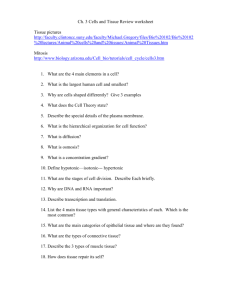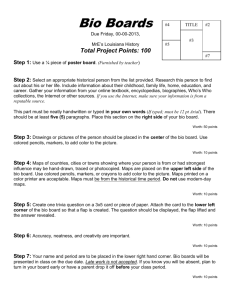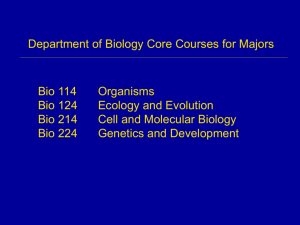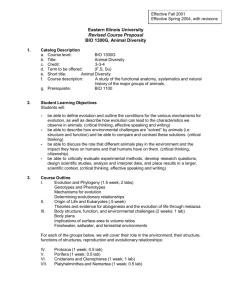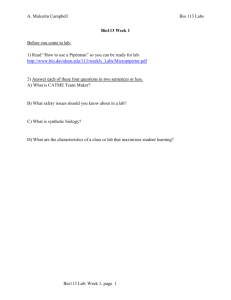Document 10296921
advertisement
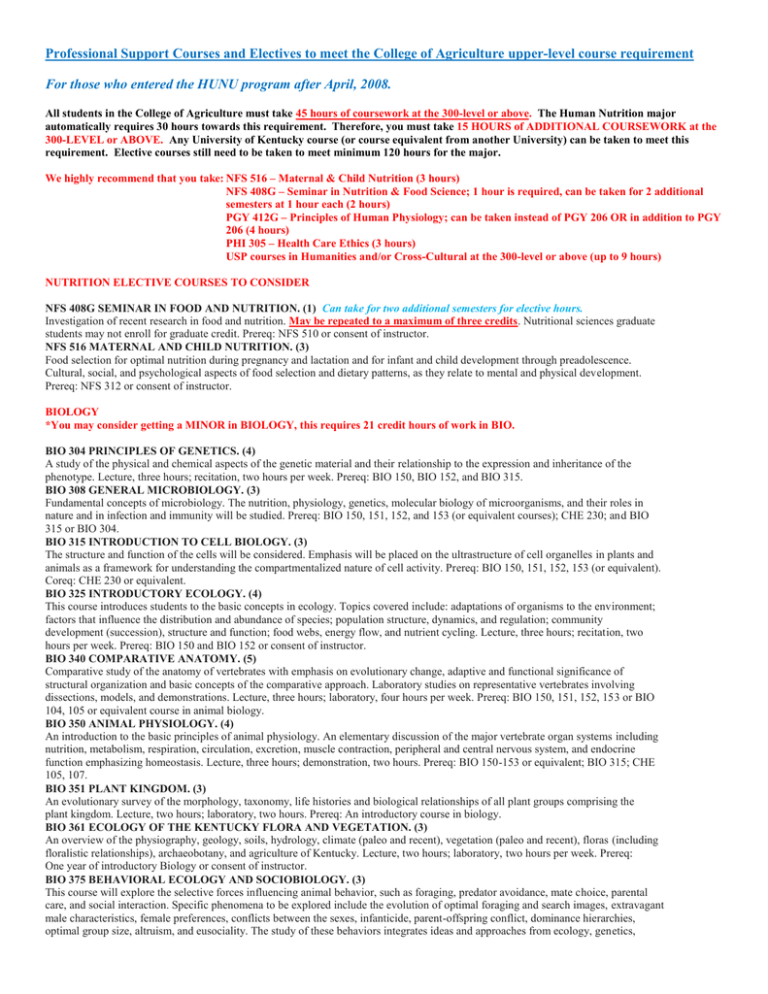
Professional Support Courses and Electives to meet the College of Agriculture upper-level course requirement For those who entered the HUNU program after April, 2008. All students in the College of Agriculture must take 45 hours of coursework at the 300-level or above. The Human Nutrition major automatically requires 30 hours towards this requirement. Therefore, you must take 15 HOURS of ADDITIONAL COURSEWORK at the 300-LEVEL or ABOVE. Any University of Kentucky course (or course equivalent from another University) can be taken to meet this requirement. Elective courses still need to be taken to meet minimum 120 hours for the major. We highly recommend that you take: NFS 516 – Maternal & Child Nutrition (3 hours) NFS 408G – Seminar in Nutrition & Food Science; 1 hour is required, can be taken for 2 additional semesters at 1 hour each (2 hours) PGY 412G – Principles of Human Physiology; can be taken instead of PGY 206 OR in addition to PGY 206 (4 hours) PHI 305 – Health Care Ethics (3 hours) USP courses in Humanities and/or Cross-Cultural at the 300-level or above (up to 9 hours) NUTRITION ELECTIVE COURSES TO CONSIDER NFS 408G SEMINAR IN FOOD AND NUTRITION. (1) Can take for two additional semesters for elective hours. Investigation of recent research in food and nutrition. May be repeated to a maximum of three credits. Nutritional sciences graduate students may not enroll for graduate credit. Prereq: NFS 510 or consent of instructor. NFS 516 MATERNAL AND CHILD NUTRITION. (3) Food selection for optimal nutrition during pregnancy and lactation and for infant and child development through preadolescence. Cultural, social, and psychological aspects of food selection and dietary patterns, as they relate to mental and physical development. Prereq: NFS 312 or consent of instructor. BIOLOGY *You may consider getting a MINOR in BIOLOGY, this requires 21 credit hours of work in BIO. BIO 304 PRINCIPLES OF GENETICS. (4) A study of the physical and chemical aspects of the genetic material and their relationship to the expression and inheritance of the phenotype. Lecture, three hours; recitation, two hours per week. Prereq: BIO 150, BIO 152, and BIO 315. BIO 308 GENERAL MICROBIOLOGY. (3) Fundamental concepts of microbiology. The nutrition, physiology, genetics, molecular biology of microorganisms, and their roles in nature and in infection and immunity will be studied. Prereq: BIO 150, 151, 152, and 153 (or equivalent courses); CHE 230; and BIO 315 or BIO 304. BIO 315 INTRODUCTION TO CELL BIOLOGY. (3) The structure and function of the cells will be considered. Emphasis will be placed on the ultrastructure of cell organelles in plants and animals as a framework for understanding the compartmentalized nature of cell activity. Prereq: BIO 150, 151, 152, 153 (or equivalent). Coreq: CHE 230 or equivalent. BIO 325 INTRODUCTORY ECOLOGY. (4) This course introduces students to the basic concepts in ecology. Topics covered include: adaptations of organisms to the environment; factors that influence the distribution and abundance of species; population structure, dynamics, and regulation; community development (succession), structure and function; food webs, energy flow, and nutrient cycling. Lecture, three hours; recitation, two hours per week. Prereq: BIO 150 and BIO 152 or consent of instructor. BIO 340 COMPARATIVE ANATOMY. (5) Comparative study of the anatomy of vertebrates with emphasis on evolutionary change, adaptive and functional significance of structural organization and basic concepts of the comparative approach. Laboratory studies on representative vertebrates involving dissections, models, and demonstrations. Lecture, three hours; laboratory, four hours per week. Prereq: BIO 150, 151, 152, 153 or BIO 104, 105 or equivalent course in animal biology. BIO 350 ANIMAL PHYSIOLOGY. (4) An introduction to the basic principles of animal physiology. An elementary discussion of the major vertebrate organ systems including nutrition, metabolism, respiration, circulation, excretion, muscle contraction, peripheral and central nervous system, and endocrine function emphasizing homeostasis. Lecture, three hours; demonstration, two hours. Prereq: BIO 150-153 or equivalent; BIO 315; CHE 105, 107. BIO 351 PLANT KINGDOM. (3) An evolutionary survey of the morphology, taxonomy, life histories and biological relationships of all plant groups comprising the plant kingdom. Lecture, two hours; laboratory, two hours. Prereq: An introductory course in biology. BIO 361 ECOLOGY OF THE KENTUCKY FLORA AND VEGETATION. (3) An overview of the physiography, geology, soils, hydrology, climate (paleo and recent), vegetation (paleo and recent), floras (including floralistic relationships), archaeobotany, and agriculture of Kentucky. Lecture, two hours; laboratory, two hours per week. Prereq: One year of introductory Biology or consent of instructor. BIO 375 BEHAVIORAL ECOLOGY AND SOCIOBIOLOGY. (3) This course will explore the selective forces influencing animal behavior, such as foraging, predator avoidance, mate choice, parental care, and social interaction. Specific phenomena to be explored include the evolution of optimal foraging and search images, extravagant male characteristics, female preferences, conflicts between the sexes, infanticide, parent-offspring conflict, dominance hierarchies, optimal group size, altruism, and eusociality. The study of these behaviors integrates ideas and approaches from ecology, genetics, physiology, and psychology. Students will be encouraged to read outside material, to think carefully, logically, and critically about ideas, and to ask questions and defend their views in class. Prereq: A year of introductory biology (BIO 150/152). BIO 395 RESEARCH IN BIOLOGY. (1-3) An independent research project in an area of biology under the direction of a faculty mentor. The research may be conducted in the School of Biological Sciences or in other biological units on campus. A research contract signed by the student and the faculty research mentor must be approved by the Director of Undergraduate Studies in Biology. May be repeated to a maximum of 12 credits, but a maximum of only 6 credits may be used the satisfy the requirements of a BS or BA in Biology. Prereq: BIO 150, 151, 152, and 153. Completion of at least one of the Biology core courses (Cell Biology, Genetics, Physiology, Ecology) is strongly recommended. BIOCHEMISTRY BCH 401G FUNDAMENTALS OF BIOCHEMISTRY. (3) Descriptive chemistry of amino acids and proteins, carbohydrates, lipids, and nucleic acids. Discussion of structure and function; metabolism and bioenergetics; and biological information flow. At the undergraduate level, understanding is demonstrated through hour examinations; at the graduate level, understanding is demonstrated through hour examinations and a brief paper. Lecture, three hours; one optional conference. Prereq: CHE 107, CHE 236 and BIO 152 or equivalent. CLINICAL NUTRITION CNU 501 NUTRACEUTICALS AND FUNCTIONAL FOODS IN HEALTH AND DISEASE PREVENTION. (2) The course will cover the classification, brief history and the impact of nutraceuticals and functional foods on health and disease. An example of nutraceuticals to be covered in the course include isoprenoids, isoflavones, flavanoids, carotenoids, lycopene, garlic, omega 3 fatty acids, sphingolipids, vitamin E and antioxidants, S-adnosyl-L-methionine, CLA, creatine, herbal products in foods and lipoic acid. Prereq: Undergraduate organic chemistry and/or biochemistry. EXPERIENTAL EDUCATION Students should consider doing an internship in their potential field of graduate or professional study. Visit the Stuckert Career Center for further internship advice and course details. EXP 396 EXPERIENTIAL EDUCATION. (1-12) A community-based or field-based learning experience under the supervision of a faculty member. May be repeated to a maximum of 30 credits. Pass/fail with departmental permission required for letter grade. Prereq: Completion of Experiential Education Learning Contract and submission of contract to Career Center prior to course registration. FOOD SCIENCE FSC 306 INTRODUCTION TO FOOD PROCESSING. (4) Commercial processing of foods including theory and use of heat exchangers, separators, freezers, air and vacuum dryers, evaporators, membrane separation, electrodialysis, emulsion formers, extruders, and irradors. Physico-chemical changes in osmotic pressure, vapor pressure, pH surface tension, viscosity, emulsification and colloidal dispersions in processed foods will be discussed. Processing of waste streams will also be discussed. Prereq: CHE 105, CHE 107, CHE 236. FSC 434G FOOD CHEMISTRY. (4) Chemical and physical properties of proteins, lipids, carbohydrates, pigments and food additives as they relate to food processing and food preservation. Lecture, three hours; laboratory, two hours. Prereq: BCH 401G or consent of instructor. FSC 530 FOOD MICROBIOLOGY. (5) Study of procedures for the enumeration and identification of foodborne microorganisms important in the food industry. Principles for controlling contamination and growth of microorganisms during production, processing, handling and distribution of food products. Lecture, three hours; laboratory, four hours. Prereq: BIO 108 and BIO 109 or equivalent. KINESIOLOGY AND HEALTH PROMOTION KHP 300 PSYCHOLOGY AND SOCIOLOGY OF PHYSICAL EDUCATION AND SPORT. (3) A survey course in the social science foundation of sport. Study of the sociological and psychological concepts which are relevant in understanding of sport in this country and the world. After the successful completion of this course, the student should be able to define, discuss, and identify the basic social and psychological factors which are related to the pursuit of movement through sport. PHILOSOPHY PHI 305 HEALTH CARE ETHICS. (3) A consideration of the ethical issues and difficult choices generated or made acute by advances in biology, technology, and medicine. Typical issues include: informed consent, healer-patient relationships, truth telling, confidentiality, problem of birth defects, abortion, placebos and health, allocation of scarce medical resources, genetic research and experimentation, cost containment in health care, accountability of health care professionals, care of the dying, and death. PHI 380 DEATH, DYING AND THE QUALITY OF LIFE. (3) A philosophical and interdisciplinary investigation of a cluster of prominent issues about the meaning of life and death, caring for dying persons, and the quality of life of the terminally ill. Among topics included are: death definitions and criteria; allowing to die vs. killing; euthanasia and suicide; life prolongation, ethics of care of the terminally ill; and rights of the dying. PHYSIOLOGY PGY 412G PRINCIPLES OF HUMAN PHYSIOLOGY LECTURES. (4) Intermediate level human physiology course emphasizing applied concepts. Prereq: One year biology or PGY 206. PGY 502 PRINCIPLES OF SYSTEMS, CELLULAR AND MOLECULAR PHYSIOLOGY. (5) Advanced survey of major mammalian physiological systems at the systems, cellular and molecular level; lectures, assigned reading, advanced texts or monographs, demonstrations and problem oriented study questions. Prereq: One year each, physics, general chemistry; PGY 206 or its equivalent. (Same as BIO 502.) PSYCHOLOGY PSY 331 THE PSYCHOLOGY OF ADJUSTMENT. (3) The individual’s psychological adjustment to society is analyzed from a mental health perspective. The course provides a general orientation to the normal-abnormal continuum of behavior, including individual, social, and cultural determinants of behavior. Prereq: PSY 100. Not open to students who have had CH 520. PUBLIC HEALTH CPH 535 DATABASES AND SAS PROGRAMMING. (3) Students will learn how to construct and maintain databases with applications to public health. They will also learn how to program in SAS, the leading statistical analysis system. SAS skills include report writing, MACRO writing, and Programming using SAS Intranet. Lecture, two hours; laboratory, two hours per week. Prereq: STA 291 or equivalent. UNIVERSITY STUDIES PROGRAM (FROM UK BULLETIN 2008-2009) Students should consider taking courses to meet Humanities and/or Cross-Cultural requirements at the 300-level or above. To fulfill the humanities requirement, complete six hours from the following courses: (ONLY 300-Level Options Listed) Chinese Culture and Language CHI 321 Introduction to Contemporary Chinese Film Classics CLA 331 Gender and Sexuality in Antiquity CLA 382 Greek and Roman Religion English ENG 331 Survey of British Literature I ENG 332 Survey of British Literature II ENG 334 Survey of American Literature I ENG 335 Survey of American Literature II German GER 361 German Cinema History HIS 370 Early Middle Ages HIS 371 Later Middle Ages HIS 385 History of Russia to 1825 HIS 386 History of Russia Since 1825 Music MUS/AAS 300 History of Jazz MUS 301 Appalachian Music Russian and Eastern Studies HJS 324 Jewish Thought and Culture I: From Ancient Israel to the Middle Ages HJS 325 Jewish Thought and Culture II: From the Expulsion from Spain to the Present RUS 380 Nineteenth-Century Russian Literature (in English) RUS 381 Russian Literature 1900-Present (in English) To fulfill the cross-cultural requirement, complete one course from the following options: (ONLY 300-Level Options Listed) AAS 328 Geography of the Middle East and North Africa AAS 336 Geography of Sub-Saharan Africa AAS 417G Survey of Sub-Saharan Politics AAS 431G Cultures and Societies of Sub-Saharan Africa AIS 328 Islamic Civilization I AIS 330 Islamic Civilization II ANT 320 Andean Civilization ANT 321 Introduction to Japanese Culture, Meiji (1868) to Present ANT 322 Aztec and Maya Civilization ANT 323 Peoples of the Pacific Islands ANT 324 Contemporary Latin American Cultures ANT 327 Culture and Societies of India ANT 431G Cultures and Societies of Sub-Saharan Africa CHI 320 Gender Politics in Chinese Literature CHI 321 Introduction to Contemporary Chinese Film EPE 555 Comparative Education GEO 324 Geography of Central and South America and the Caribbean GEO 328 Geography of the Middle East and North Africa GEO 330 Geography of South Asia GEO 332 Geography of Southeast Asia GEO 333 Geography of East Asia GEO 334 Environment, Society and Economy of Japan GEO 336 Geography of Sub-Saharan Africa HIS 536 Intellectual and Cultural History of Russia to 1800 HIS 548 History of the Middle East: 1453-1920 HIS 549 History of the Middle East: 1952 to Present HIS 550 Studies in Mid-East History and Politics (Subtitle required) HIS 561 The Intellectual and Cultural History of Latin America HIS 562 Modern Mexico HIS 593 East Asian History Since World War II HIS 597 Westerners in East Asia, 1839 to the Present HIS 598 China in Revolution, 1895-1976 JPN 320 Introduction to Japanese Culture, Pre-Modern to 1868 JPN 321 Introduction to Japanese Culture, Meiji (1868) to Present JPN 334 Environment, Society and Economy of Japan PHI 343 Asian Philosophy PHI 504 Islamic and Jewish Philosophy and the Classical Tradition PS 417G Survey of Sub-Saharan Politics PS 420G Governments and Politics of South Asia PS 428G Latin American Government and Politics RUS 370 Russian Folklore (in English) SOC 380 Globalization: A Cross-Cultural Perspective SPA 314 Civilization of Spanish America REQUIREMENTS FOR A MINOR IN BIOLOGY (FROM UK BULLETIN 2009-2010) Minor in Biological Sciences A minimum of 21 semester hours is required for the minor in biological sciences, to be distributed as follows: Preminor Requirements BIO 150 Principles of Biology I ..................................... 3 BIO 151 Principles of Biology Laboratory I .................. 2 BIO 152 Principles of Biology II .................................... 3 BIO 153 Principles of Biology Laboratory II ................. 2 Minor Requirements Two courses from the following list: BIO 304 Principles of Genetics ...................................... 4 BIO 315 Introduction to Cell Biology ........................... 3 BIO 325 Introductory Ecology ....................................... 4 *BIO 350 Animal Physiology ........................................ 4 or BIO 430G Plant Physiology .................................. 3 *Biology minors with strong interests in plants may substitute BIO 430G for BIO 350 with advisor’s approval. Minor Electives Approved BIO or other courses at the 200 level or higher. Up to three hours of BIO 395, Research in Biology, may be counted here.
